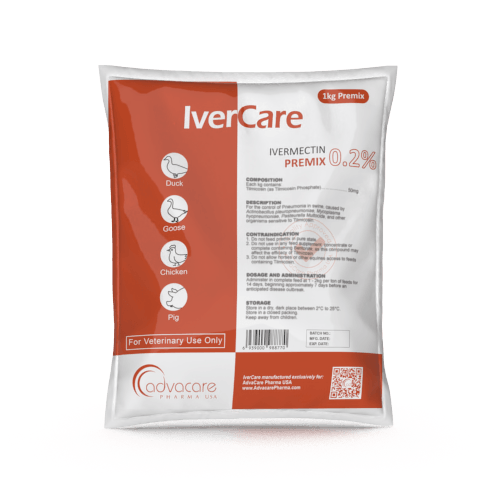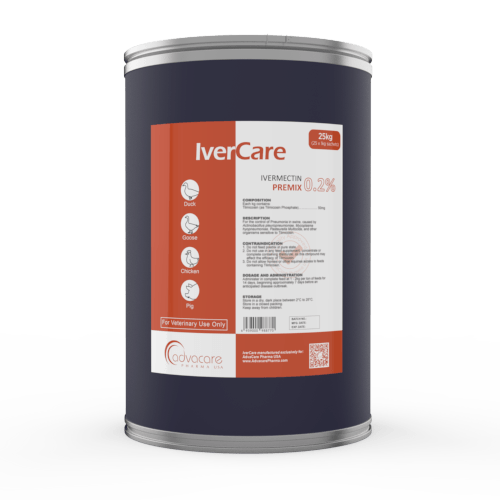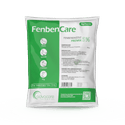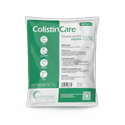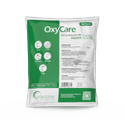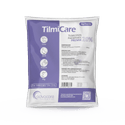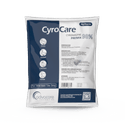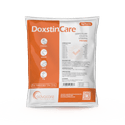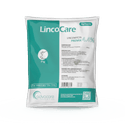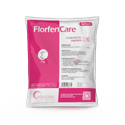- Home›
- Veterinary Pharmaceuticals›
- Veterinary Powders and Premixes›
- Veterinary Premixes›
- Ivermectin Premix
Ivermectin Premix
Dosage
Packaging
What is Ivermectin?
Active Ingredients: Ivermectin
Ivermectin Premix is an antiparasitic drug used to treat internal and external parasites in poultry and pigs. This feed additive is an effective and convenient treatment against a wide range of parasites, including roundworms, lungworms, lice, mites, and mange.
Ivermectin is within the family of medicines called anthelmintics. It is derived from avermectin, which was derived from Streptomyces avermitilis's fermented products. Ivermectin works by inhibiting the function of aspects of the nervous system within the parasite. This leads to its paralysis and then the death of the parasite. Ivermectin functions by inducing neurological damage to specific parasites, leading to their paralysis and subsequent demise.
Recognized as a "wonder drug," it is derived from a singular microorganism isolated from Japanese soil. Ivermectin finds extensive application in both human and animal contexts. While traditionally employed for eradicating a broad spectrum of internal and external parasites in commercial livestock and companion animals, its recent utilization in human medicine has been noted.
The absorption of Ivermectin is contingent on factors such as the route of administration, formulation, and the species of the animal. Upon entering the bloodstream, the drug binds to albumins and lipoproteins, distributing throughout the entire organism. While a portion of the drug accumulates, another portion undergoes biotransformation in the liver and fat tissues. The excretion process is gradual, with approximately 2% eliminated through urine and more than 90% through bile and feces.
The therapeutic effects of Ivermectin in animals are influenced by variations in breed, body condition, quantification methods, and absorption.
It is important to note that Ivermectin Premix is for veterinary purposes only.
This drug is also available in the form of injection, pour-on solution, oral solution, and tablet. It is also available in combination with Closantel. The treatment choice depends on the choice of the veterinarian and the current health condition of the animal.
AdvaCare Pharma is a trusted global exporter of Ivermectin Premix. This medication is manufactured in our GMP-certified facilities in China, India, and the USA. Our production facilities are regularly inspected to ensure they comply with WHO's standards, rules, and regulations.
Why are we a top Ivermectin manufacturer?
AdvaCare Pharma is a reputable and leading manufacturer of Ivermectin Premix. Our product range of 250+ veterinary medicines are customized and adapted to address the market requirements of our veterinary distributors. We provide unparalleled assistance throughout the entire journey - including support with documentation and product registration. By adhering to strict GMP standards, we ensure that the manufacturing of our Ivermectin Premix and 30+ other veterinary premixes and oral powders are efficacious and of reliable quality.
Uses
What is Ivermectin used for?
It's used to treat certain parasitic infections, including:
- gastrointestinal roundworms (adults and 4th stage larvae)
- lungworms (adults and 4th stage larvae)
- sucking lice
- mites
What animals can be treated with Ivermectin Premix?
This drug is recommended for poultry and pigs.
How is Ivermectin Premix used?
This product has been manufactured as powder, which is intended to be mixed into feed. The product should be used immediately when mixed with feed. Thoroughly mix the powder with the intended feed and administer immediately to ensure its effectiveness. Measure the appropriate dosage and evenly disperse into the animal feed. The feed should be provided as soon as possible.
Why are Ivermectin Tablets used in animals?
Ivermectin is a GABA agonist and causes paralysis in susceptible arthropods and nematodes that cause serious infections in animals. This antiparasitic drug works by interfering with the nervous system and muscle function of parasites. It enhances the release of a neurotransmitter that causes paralysis and death, thereby clearing parasites from the animal's body.
This drug can help in treating parasitic infections in pigs like gastrointestinal nematodes, including Ascaris suum, Hyostrongylus rubidus, Oesophagostomum spp., Strongyloides ransomi, and Trichocephalus suis. It is also effective against pulmonary infections like Metastrongylus spp., as well as Stephanurus dentatus, Haemotopinus suis, and Sarcoptes scabiei. In poultry, Ivermectin has proven to be effective in treating a variety of parasitic infections in poultry. It exhibits significant efficacy against most adult roundworm species, including common ones like Ascaridia galli (large roundworm), Heterakis gallinarum (cecal worm), Syngamus trachea (gapeworm), and Oxyspirura mansoni (manson eye worm). Additionally, it demonstrates variable effectiveness against Capillaria (threadworms) when administered at safe dosages. In the cases of mite infestations, Ivermectin is effective against several species. It has demonstrated efficacy against mites such as Cytodites nudus (airsac mites), Laminosioptes cisticola (fowl cyst mites), Knemidocoptes mutans (scaly leg mites), and Cnemidocoptes derooi. However, its effectiveness with Ornithonyssus spp (fowl mites) may vary, showing mixed results.
Can Ivermectin Premix be used concurrently with other dewormers or antiparasitic drugs?
While Ivermectin can sometimes be used with other medications, it is important to avoid drug interactions, including benzodiazepines, ketamine, spinosad, amiodarone, carvedilol, clarithromycin, cyclosporine, and ketoconazole. Always inform the veterinarian about any other treatments the animal is receiving.
Can Ivermectin be used in humans?
Ivermectin is approved for treating certain infections by parasitic worms, head lice, and skin conditions, but not in the form of premix. The FDA has not authorized or approved Ivermectin for the prevention and treatment of COVID-19 in humans.
Is Ivermectin effective against all parasites?
No, Ivermectin is not effective against all parasites. Some parasites are resistant to Ivermectin if the drug is used improperly. Some farmers use it as a prevention, but it can cause resistance in those animals. It is also not effective against certain external parasites like ticks, certain flukes, or tapeworms. The veterinarian should determine whether this drug is a proper choice for a certain parasitic infection.
How should Ivermectin Premix be stored?
This medication should be stored in a dark, dry location under 30°C.
What is the withdrawal period for Ivermectin?
The withdrawal period is 35 days. Do not use this medicine for lactating dairy cows, as the withdrawal time for unknown.
Dosage
How much Ivermectin Premix should be given to pigs?
The usual dose is 300mcg/kg.
Refer to a veterinary doctor or pharmacist for guidelines on dosage.
Side Effects
As with all pharmaceuticals, some unwanted effects can occur from the use of Ivermectin Premix.
Serious side effects may include:
- allergic reaction (skin rash, fever, facial swelling, or difficulty breathing)
- swelling and pruritus
- shock and neurotoxicity
Observe the animal after you administer this drug. If you notice any side effects, contact a veterinarian as soon as possible.
For a comprehensive list of all possible side effects of this medication, consult a veterinarian.
Precautions
Do NOT use Ivermectin Premix for an animal that:
- has a known allergy or hypersensitivity to any of the ingredients.
- is a foal less than 4 months old or a puppy less than 6 weeks old.
- is of the following species: chelonian, Indigo snake, and skink
- is a dairy animal within 28 days of calving.
- is producing milk for human consumption.
Administration of this medication requires caution in animals that are susceptible to the ABCB1-1∆ (MDR1-allele) mutation. Collie-type breeds should undergo at least 8 hours of observation post-treatment, as this drug can induce a mutation in their multi-drug resistance gene. Not all Collies and herding dogs possess this mutation, and testing for it is advisable before administering the drug. Common symptoms of ivermectin toxicity in these breeds include neurological signs. Avoid using this drug to treat parasitic infections in dogs, particularly Collie breeds; alternative forms of the medication are available for dogs. This form of drug is intended only for pigs and poultry and should not be applied to dogs.
Be cautious with the following:
- Known drug interactions exist, including with benzodiazepines, ketamine, spinosad, amiodarone, carvedilol, clarithromycin, cyclosporine, and ketoconazole.
- False-negative results for occult heartworm infections may occur.
- The product is intended for animal use only and should be administered by a veterinarian or in accordance with provided instructions.
- Adhere to the veterinarian's recommended dosage to prevent potential side effects from higher dosages. Promptly manage accidental overdoses and address health issues appropriately.
- Maintain good hygiene practices during drug administration.
- In the event of a missed dose, avoid administering two doses simultaneously.
Keep this drug out of reach of children and animals.
What are the most common animals for which Ivermectin Premix is used?
Ivermectin Premix is primarily utilized for the treatment of parasitic infections in poultry and pigs. The specific common uses of Ivermectin Premix include the treatment of the following:
- gastrointestinal parasitic infestations
- respiratory parasitic infestations
- sucking lice
- mites
Pig Parasitic Infections
This drug can help in treating parasitic infections like gastrointestinal nematodes, including Ascaris suum, Hyostrongylus rubidus, Oesophagostomum spp., Strongyloides ransomi, and Trichocephalus suis. It is also effective against pulmonary infections like Metastrongylus spp., as well as Stephanurus dentatus, Haematopinus suis, and Sarcoptes scabiei.
Poultry Parasitic Infections
Ivermectin has proven to be effective in treating a variety of parasitic infections in poultry. It shows significant efficacy against most adult roundworm species, including common ones like Ascaridia galli (large roundworm), Heterakis gallinarum (cecal worm), Syngamus trachea (gapeworm), and Oxyspirura mansoni (manson eye worm). Additionally, it demonstrates variable effectiveness against Capillaria (threadworms) when administered at safe dosages. In the cases of mite infestations, Ivermectin is effective against several species. It has demonstrated efficacy against mites such as Cytodites nudus (airsac mites), Laminosioptes cisticola (fowl cyst mites), Knemidocoptes mutans (scaly leg mites), and Cnemidocoptes derooi. However, its effectiveness with Ornithonyssus spp (fowl mites) may vary, showing mixed results.

You might be interested in...
Why AdvaCare Pharma?
As an industry leader, we are aware of our responsibility to provide affordable and sustainable solutions to improve healthcare worldwide.
